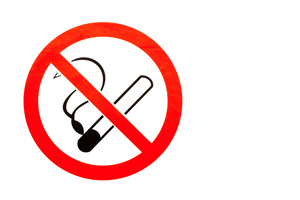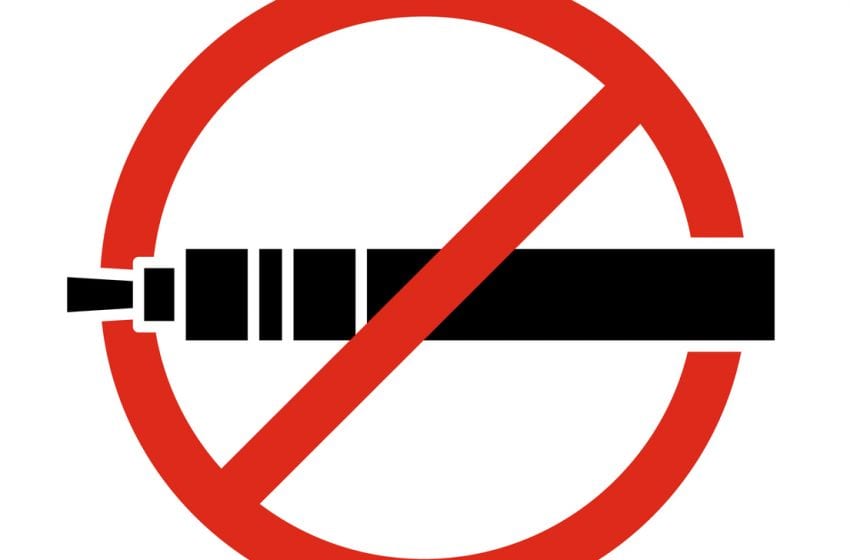Electronic cigarettes are not an effective means to quit smoking, according to a story in The Asahi Shimbun citing an online study by Japan’s National Cancer Center.
“Some e-cigarette products are touted as being useful for smoking cessation, but we do not recommend that they be used for that purpose,” an official at the center was quoted as saying.
But this recommendation was made in spite of the fact that it was conceded that e-cigarettes could help smokers quit their habit.
“E-cigarettes could help smokers kick the habit,” said Itsuro Yoshimi, a senior official at the center. “But they could also have a negative impact: deceiving smokers so they will not select more effective smoking cessation means.”
The situation in Japan is further complicated because nicotine-containing e-cigarettes are effectively banned there by restrictions on the sale of nicotine, though the story pointed out that while producing and selling nicotine were restricted by law, individuals ‘can’ import liquid containing nicotine by themselves.
The study covered 798 people ranging in age from 20 to 69 who said they had attempted to quit smoking during the past five years.
The success rate for people who used e-cigarettes was said to be 40 percent lower than the rate for people who did not use these products, the study found.
People who received drug therapy at hospitals were more likely to quit smoking than those who did not see physicians, the study showed.
Category: People

Drugs key to quitting

Smokers over-taxed
Is it ethical for the New Zealand government to collect nearly $2 billion in extra tax from addicted smokers while spending only three percent of the money on helping them to quit? Should an addicted ‘pack-a-day’ smoker have to pay an extra NZ$7,000 in tax each year?
These questions were posed in an opinion piece in The Dominion Post by Kathy Spencer, a former deputy director-general in the Ministry of Health and a former manager of personal and indirect tax in the Treasury who has worked also as a senior advisor to a Minister of Health and a Minister of Revenue.
Spencer said that with a new government about to review the tax system, it was time for a fresh look at how to reduce smoking in New Zealand.
For a very long time, the tax on tobacco had been the government’s primary weapon against smoking. It was claimed to be the most effective method, but Māori, Pasifika and low-income groups had been slower to give up smoking than had other New Zealanders; so the people within these groups were paying a disproportionate share of this tax, which was going up relentlessly.
Spencer said a common belief was that the tobacco tax was there to cover the public health costs associated with smoking, including passive smoking.
First off, the idea that smokers should be expected to meet these costs was highly questionable since people who were overweight or had bad diets were not expected to pay extra towards their health costs. New Zealand’s public health system simply didn’t work that way, and nor should it.
However, even if were accepted that smokers should pay for health costs, it started to become clear 10 years ago that they were over-paying. A 2007 study commissioned by tobacco control groups concluded: ‘It appears likely that smokers contribute considerably more in taxes than the net “economic costs” to the rest of the community caused by their smoking’.
Spencer said that in 2012, the Treasury also acknowledged that the tax revenue was probably higher than the direct health system costs of smoking. And it noted that smokers received less superannuation and aged care, reducing costs in these areas.
‘Taking these savings into account means that smokers have been paying their own way, and more, for years,’ Spencer said.
Spencer’s piece, which includes suggestions for tackling the tobacco-tax issue, is at: https://www.stuff.co.nz/dominion-post/comment/100188998/tax-burden-unfair-on-smokers.

Local buying ‘encouraged’
Indonesia is planning to make the import of unmanufactured tobacco costlier than it has been to date, and to make it conditional on the importer’s buying local tobacco, according to a story in Indonesia Investments.
The country’s Co-ordinating Minister for Economic Affairs, Darmin Nasution, has confirmed that the government plans in 2018 to raise the import tariff on unmanufactured tobacco from its current level of five percent, though it is not known what the new rate will be.
Besides the higher import tariff, a number of new rules are being formulated that, in part, will require ‘importers/distribution centers’ to absorb a certain amount of locally-produced tobacco. Only those importers that obtain a recommendation letter from the Agriculture Ministry will be able to import tobacco, and this letter will be issued only to those companies that purchase ‘enough’ tobacco from local producers.
These regulations are reportedly aimed at improving the welfare of Indonesian tobacco producers and raising government revenues.
Currently, with a five percent import duty in place, Indonesian cigarette manufacturers are said not to be ‘encouraged’ to absorb locally-produced tobacco.
Based on data from Statistics Indonesia (BPS), the value of unmanufactured-tobacco imports into Indonesia during January-July 2017 was US$318.49 million, up 16.11 percent from that of the equivalent period of 2016.
Meanwhile, Indonesia’s cigarette production is thought to have risen to about 360 billion in 2017, from 342 billion during 2016.

Puffing along in China
In China, a passenger is suing a local railway authority for allowing passengers to smoke on trains, according to a story in the China Daily.
The Beijing Railway Transport Court held a hearing on Wednesday in respect of a case brought by a female passenger surnamed Li against the Harbin Railway Bureau (HRB).
While traveling on June 9 from Beijing to Tianjin on train K1301 operated by HRB Li noticed ‘lots of passengers’ smoking between two carriages, though the company’s ‘safety tips’ state that smoking is banned everywhere on the train.
After filing a series of complaints that generated no useful response, Li decided to sue, demanding compensation for her ticket, valued at 102.5 yuan ($13), her legal expenses, and 1 yuan as compensation for her mental suffering.
She demanded also that the HRB issue a smoking ban on train K1301, which is not a high-speed train, and on the platforms at Beijing and Tianjin stations, and the removal of smoking areas and ashtrays.
In court, the defendant argued that the case was a dispute of transportation contract in name only and was essentially a public interest lawsuit. It demanded the court dismiss Li’s request since her claim did not meet the conditions in either case.
HRB said it believed it had fulfilled its contract obligations as the passenger was transported to her destination safely. Setting up smoking areas and ashtrays was a humane management measure rather than a violation of law.
“The complete ban of smoking on regular trains that often take 30 hours to finish a journey is unrealistic,” according to an HRB agent. “Otherwise some people would smoke in the carriages, which is much more dangerous.”

Quit aids failing smokers
A new study by researchers at the University of California San Diego School of Medicine suggests that, despite promising results in clinical trials, smoking cessation drugs alone might not be improving the chances of successful quitting among smokers in general, according to a story on medicalxpress.com.
“Thirty-four percent of people who are trying to quit smoking use pharmaceutical aids and yet most are not successful,” said senior study author John P. Pierce, PhD, Professor Emeritus in the Department of Family Medicine and Public Health at UC San Diego School of Medicine and Moores Cancer Center.
“The results of randomized trials that tested these interventional drugs showed the promise of doubling cessation rates, but that has not translated into the real world.”
The study, published online in the Journal of the National Cancer Institute on December 21, assessed the effectiveness of three first-line medications recommended by clinical practice guidelines: varenicline, bupropion and nicotine replacement therapy (patch).
The data was collected from the Current Population Survey – Tobacco Use Supplement – a US Census survey of adults 18 years or older conducted to obtain information about the country’s use of tobacco products.
The Medical Express story is at: https://medicalxpress.com/news/2017-12-medications-dont-smokers.html.

Focus on heart disease
‘Tobacco and heart disease’ is scheduled to be the focus of World No Tobacco Day 2018, according to a note posted on the World Health Organization’s website.
WHO says the campaign, which is held every year on May 31, will increase awareness of the link between tobacco and heart and other cardiovascular diseases (CVDs), including stroke, which combined are the world’s leading causes of death.
And it will aim to increase awareness of feasible actions and measures that can be taken to reduce the risks posed by tobacco to heart-health.
‘Tobacco use is an important risk factor for the development of coronary heart disease, stroke, and peripheral vascular disease,’ WHO said.
‘Despite the known harms of tobacco to heart health, and the availability of solutions to reduce related death and disease, knowledge among large sections of the public that tobacco is one of the leading causes of CVD is low.’
WHO said CVDs killed more people than any other cause of death worldwide, and that tobacco use and second-hand smoke exposure contributed to about 12 percent of all heart disease deaths. ‘Tobacco use is the second leading cause of CVD, after high blood pressure,’ it said.
‘The global tobacco epidemic kills more than seven million people each year, of which close to 900 000 are non-smokers dying from breathing second-hand smoke.
‘Nearly 80 percent of the more than one billion smokers worldwide live in low- and middle-income countries, where the burden of tobacco-related illness and death is heaviest.’

Suffering from the cure?
In Canada, The American Journal of Respiratory and Critical Care Medicine has published the results of research indicating that users of Varenicline, a commonly prescribed drug for smoking cessation, were 34 percent more likely than non-users to require an emergency department visit or hospitalization for a cardiovascular event while taking the drug.
The authors said that the study was observational and could not determine cause and effect.
According to a EurekAlert! story relayed by the TMA, the study analyzed the medical records of 56,851 new users of Varenicline between September 2011 and February 2015 living in Ontario.
“Previous studies regarding the safety of Varenicline have been conflicting and most examined people with relatively similar characteristics and backgrounds in highly controlled settings,” said lead study author Andrea S. Gershon, MD, an associate professor of medicine at the University of Toronto and a scientist at the Institute for Clinical Evaluative Sciences and Sunnybrook Health Sciences Centre in Ontario, Canada.

What smoking bans?
A prisoner has lost his attempt to enforce the smoking ban in English and Welsh jails after the supreme court ruled that crown premises are effectively exempt from the enforcement of health regulations, according to a story in The Guardian.
The unanimous judgment from the UK’s highest court will prevent the inmate from calling the National Health Service’s smoke-free compliance line to report breaches of the ban.
Lady Hale, the president of the supreme court, said she was driven with “considerable reluctance” to conclude that when parliament passed the 2006 Health Act, prohibiting smoking in offices, bars and enclosed areas, it did not mean to extend it to government or crown sites.
Sean Humber, head of the prison law team at the law firm Leigh Day who represented the inmate, said: “Why shouldn’t those living, working or visiting government properties be subject to the same laws, and indeed benefit from the same legal protections, as the rest of us?
“This judgment has far wider implications than simply the issue of smoking in prisons. It confirms that thousands of government properties, including, for example, courts and jobcentres, are not covered by the provisions of the Health Act prohibiting smoking in enclosed places. While many of these buildings even have signs saying it is against the law to smoke in them, these turn out to be incorrect.”
The Guardian’s story is at: https://www.theguardian.com/society/2017/dec/19/jails-exempt-smoking-ban-uk-supreme-court-rules.

Banning vaping at home
The rules governing public housing in the US are changing – to the detriment of smokers and vapers, according to a story by Lindsay Tuman for WRDW News 12, Augusta, Georgia.
The US Department of Housing and Urban Development has declared that all public housing has to be smoke- and vapor-free.
So the consumption of cigarettes, hookah tobacco and even electronic cigarettes will no longer be allowed in units – homes – or within 25 feet of the property.
The new rules are being brought in so as to reduce the cost of building maintenance and the risk of fires, and to assuage health concerns.
If people break the rules they can be fined and, ultimately, they could lose their lease.
The housing authority where Tuman spoke with an ex-smoker resident, is said to be giving people plenty of time and resources to quit.

Voting with their butts
A borough council in Northern Ireland is trialing ‘ballot bins’ in an effort to reduce cigarette litter across the borough, according to a story by Duncan Elder for the Portadown Times.
Ballot bins, which have been used in other places in a number of guises, are customizable ashtray bins that encourage people to use them by providing smokers with the opportunity to vote on various issues.
The bins display questions about, say, favourite films or music, and users can vote for their preferred answer by putting their butts into one of the two containers.
A window in the bins displays which choice is winning.
The bins, part of Armagh City, Banbridge and Craigavon Borough Council’s Clean Neighbourhoods Action Plan, are designed to encourage people to put their cigarette butts in a bin rather than stubbing them out on the pavement.
Three such bins are being trialed within the town centres of Armagh, Banbridge and Lurgan in an effort to counter what is described in the story as the scourge of cigarette butts littering pavements.
The installation of more bins in targeted areas across the borough is planned for the New Year.
In the past the council has tried various measures aimed at reducing cigarette litter, including the imposition of big fines.










